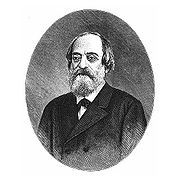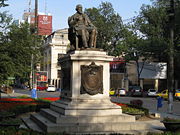
C. A. Rosetti
Encyclopedia


Romania
Romania is a country located at the crossroads of Central and Southeastern Europe, on the Lower Danube, within and outside the Carpathian arch, bordering on the Black Sea...
n literary and political leader, born in Bucharest
Bucharest
Bucharest is the capital municipality, cultural, industrial, and financial centre of Romania. It is the largest city in Romania, located in the southeast of the country, at , and lies on the banks of the Dâmbovița River....
into a Phanariot Greek
Phanariotes
Phanariots, Phanariotes, or Phanariote Greeks were members of those prominent Greek families residing in Phanar , the chief Greek quarter of Constantinople, where the Ecumenical Patriarchate is situated.For all their cosmopolitanism and often Western education, the Phanariots were...
family.
In 1845, Rosetti went to Paris
Paris
Paris is the capital and largest city in France, situated on the river Seine, in northern France, at the heart of the Île-de-France region...
, where he met Alphonse de Lamartine
Alphonse de Lamartine
Alphonse Marie Louis de Prat de Lamartine was a French writer, poet and politician who was instrumental in the foundation of the Second Republic.-Career:...
, the patron of the Society of Romanian Students in Paris. In 1847, he married Mary Grant
Maria Rosetti
Maria Rosetti was an English-born Wallachian and Romanian political activist, journalist, essayist, philanthropist and socialite. The sister of British diplomat Effingham Grant and wife of radical leader C. A. Rosetti, she played an active part in the Wallachian Revolution of 1848...
, the sister of the English consul to Bucharest, Effingham Grant. The consul was married to Zoia Racoviţă, the daughter of Alexandru Racoviţă; the Grant Bridge (Podul Grant) near Gara de Nord
Gara de Nord
București Gara de Nord is the main railway station in Bucharest and the largest railway station in Romania...
in Bucharest is named after him.
Rosetti took part in the Wallachian Revolution of 1848
Wallachian Revolution of 1848
The Wallachian Revolution of 1848 was a Romanian liberal and Romantic nationalist uprising in the Principality of Wallachia. Part of the Revolutions of 1848, and closely connected with the unsuccessful revolt in the Principality of Moldavia, it sought to overturn the administration imposed by...
. He was among the first arrested by Prince Gheorghe Bibescu
Gheorghe Bibescu
Gheorghe Bibescu was a hospodar of Wallachia between 1843 and 1848. His rule coincided with the revolutionary tide that culminated in the 1848 Wallachian revolution.-Early political career:...
, who accused Rosetti of plotting to kill him. After the provisional government came to power on June 11, 1848, he held the post of chief of police
Romanian Police
The Romanian Police is the national police force and main civil law enforcement agency in Romania. It is subordinated to the Ministry of Interior and Administrative Reform.-Duties:The Romanian Police are responsible for:...
. He was also the editor of the first newspaper of the Muntenian revolution, Pruncul Român. He served with Nicolae Bălcescu
Nicolae Balcescu
Nicolae Bălcescu was a Romanian Wallachian soldier, historian, journalist, and leader of the 1848 Wallachian Revolution.-Early life:...
, Alexandru G. Golescu
Alexandru G. Golescu
Alexandru G. Golescu was a Romanian politician who served as a Prime Minister of Romania in 1870 .-Early life:...
and Ion C. Brătianu as a secretary of the Provisional Government until the end of June. In August, he was appointed director of the Ministry of the Interior.
After the bloody crushing of the revolution on September 13, 1848, Rosetti was arrested along with the other leaders of the revolution. His wife's intervention was crucial in their release. Rosetti, along with the Brătianu brothers, Bălcescu, and others, went into exile in France
France
The French Republic , The French Republic , The French Republic , (commonly known as France , is a unitary semi-presidential republic in Western Europe with several overseas territories and islands located on other continents and in the Indian, Pacific, and Atlantic oceans. Metropolitan France...
. While in France, he published a review favouring the creation of a national unitary state.
In 1861, he returned to Romania, and was elected deputy
Chamber of Deputies of Romania
The Chamber of Deputies is the lower house in Romania's bicameral parliament. It has 315 seats, to which deputies are elected by direct popular vote on a proportional representation basis to serve four-year terms...
, and in 1866 was minister of public instruction. Between 15 July and 16 July 1866, he was the temporary Prime Minister of Romania.
He supported the deposition
Deposition (politics)
Deposition by political means concerns the removal of a politician or monarch. It may be done by coup, impeachment, invasion or forced abdication...
of Alexander John Cuza
Alexander John Cuza
Alexander John Cuza was a Moldavian-born Romanian politician who ruled as the first Domnitor of the United Principalities of Moldavia and Wallachia between 1859 and 1866.-Early life:...
in 1866. He headed the Chamber of Deputies in 1877, and was Minister of the Interior between 1881 and 1882.
A street (Strada C. A. Rosetti) and a square (Piaţa Rosetti
Piata Rosetti
Piaţa Rosetti is a small square in Sector 2 of Bucharest, 250 metres from Piaţa Universităţii. It is named after former mayor, politician, and 1848 revolutionary C. A. Rosetti. The square was designed as part of the modernization efforts of mayor Pache Protopopescu in 1888. A statue of Rosetti...
) in central Bucharest are named after him, as well as a high school.
Further reading
- Vasile Netea, C. A. Rosetti (Bucureşti, 1970).
- Marin Bucur, C. A. Rosetti, Mesianism şi Donquijotism revoluţionar (Bucureşti, 1970).

